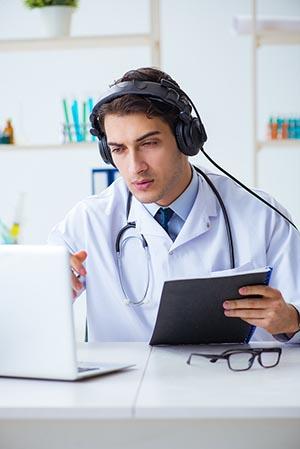Telemedicine – New Frontiers in Medicine and Potential Legal Issues

The United States is slowly moving to catch up with medical practices in some European and Asian countries in using technology to avoid an in-person doctor’s appointment. Without having to schedule and wait for an appointment, take time off from work, or leave home, a person can have common aliments diagnosed using their smartphone. Telemedicine is the use of telecommunication and technology to provide clinical healthcare at a distance.
Ailments such as the flu, bronchitis, sinus infections, sore throats, rashes, and stomach aches can often be effectively diagnosed without an in-person doctor’s visit. The increase in healthcare costs has led to the use of technology to treat more patients at less cost. Recently CVS announced that it started a nationwide telemedicine service that allows customers to use their smartphone video capabilities to “see” a doctor for conditions such as colds, skin issues, and other general wellness issues. The service will cost $59 and may eventually be covered by insurance once CVS acquires Aetna.
Medicaid, the government’s healthcare coverage for low-income individuals, has cautiously started to embrace the use of technology for limited remote patient care. Medicaid permits the use of phones, faxes, email and remote patient monitoring devices to collect and transmit patient data for monitoring and diagnosis. However, the program is closely monitored for fraudulent billings and abuse.
Each state has its own requirements and rules in using telemedicine. Some states require physicians to be licensed in the state where the patient is located, rather than simply where the physician performs her analysis. This can be easily violated when patients are in bordering states and seeking medical diagnosis and treatment through their smartphone or the internet. Record keeping is also extremely important, as all Medicaid providers are required to retain records to substantiate their billings. The use of the correct billing codes for telemedicine is paramount. If an office visit is billed for a telemedicine event, the physician may be investigated for false or fraudulent billing.
The U.S. Department of Health and Human Services Office of Inspector General and the Department of Justice devote substantial resources investigating and prosecuting healthcare fraud and abuse. The U.S. Attorney’s Offices in the DNJ, SDNY and EDNY are very active in policing medical providers’ billing and prescribing practices. Informed and experienced legal counsel is a must to advise medical providers and medical billing services in this ever-expanding use of technology and medicine.
For questions regarding health care, Medicaid or Medicare fraud, contact Stahl Gasiorowski Criminal Defense Lawyers. Our offices are located in Mountainside, New Jersey, and New York City. Contact us online or call us at 908-301-9001.















